Many people say writing can’t be taught. But it can certainly be learned.
(I actually think it can be taught as well, or I wouldn’t teach it.)
When we’re young and full of beans we like to think we know it all. It’s hard to admit to ourself we don’t how to do something. But it’s the first and most important step in learning anything worth knowing. The idea that writing is a mystical skill, only known to those with some rare combination of genetics, education and / or the grace of a Supreme Creator, is just another way of not admitting that you don’t know how to do it. If it can’t be learnt, well then you might as well just go right on not learning it, avoid all that hard work, and continue just waiting for inspiration to strike.
Learning to write good fiction does take time. I would say roughly five years, for someone with strong literacy, who already reads widely and deeply to begin with. But it can also take WAAAAAAAY longer than that. Without the right inputs, the outputs will always be rubbish. That input can be teaching. A good writing teacher can help you take quantum leaps forward in a few hours that might take years to stumble upon. Or you can read one or two good writing guides. The right guides can help you master what Stephen King calls ‘The Writer’s Toolkit’, everything from basic grammar, paragraphs and sentence structure to character, narration, scene, plot and themes. For a novice, a good writing guide should take you from enjoying texts as a reader, to understanding their structure and the tools and techniques used to build them as a writer. That’s an important shift, and one that will save years of trial and error in the learning process.
While there is a law of diminishing returns with writing guides – the more of them you read the more you find the same information repeated – the good ones, as with those I have chosen below, always reveal the unique wisdom of their authors.
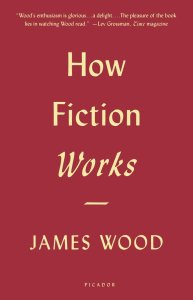 James Woods : How Fiction Works
James Woods : How Fiction Works
This is the writing guide I would most like to see read by all writers of genre fiction who disdain ‘literature’. James Woods is one of the world’s best literary critics, and Professor of Literary Criticism at Harvard. Fine credentials, in this case backed up by a slim but erudite volume on How Fiction Works which I would rate as the single best book for writers trying to achieve depth and complexity in their fiction. The worst writing guides replace craft with market knowledge. They tell the writer what will sell, which often means discouraging them from subtlety or complexity because these aren’t always valued in commercial fiction. For instance, it’s often taken as gospel by genre writers that a text’s narrative point-of-view stick to one character per scene or chapter. Unfortunately, while this makes life easier for weak readers, it also robs prose of one its great strengths, which is the ability to reflect the viewpoint of many characters even within the same sentence. Wood’s book has an excellent section on exactly this topic, as well as many other gems that will set straight any writer who spends more time considering the market than learning the craft.
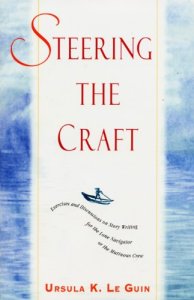 Ursula LeGuin : Steering the Craft
Ursula LeGuin : Steering the Craft
I love this book so much that I regularly re-read it for pleasure. Ursula Le Guin is one of those writers I trust absolutely to say only wise and decent things, so any advice she gives on writing is instantaneously at the top of my To Be Read list. Being a genuine and good person is an underestimated skill for writers. If you aren’t, why would anyone choose to spend hundreds of hours hanging around in your imagination? Le Guin doesn’t explicitly share ideas on how to become as wise as she in this book, instead she focuses on the often neglected fundamentals of good fiction – voice & rhythm – but it’s always possible some of the wholesomeness might rub off just through continued exposure. There are also excellent writing exercises which I have come back to again and again.
Samuel R Delany : About Writing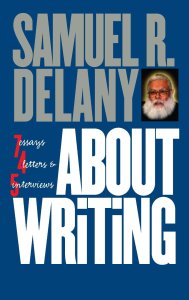
Have you ever had the experience of struggling for hours with a technical issue – maybe an intractable computer problem thats kept you up in to the wee hours – when in desperation you call in an expert who fixes it in about 18 seconds? That’s basically every other page of Delany’s hefty tome of collected writing advice. The small section on natural vs. dramatic narrative structure (Location, Action, Emotion…which most people present in reverse, thereby boring / confusing the reader) is worth the high price of this rare book in and of itself. But don’t let the fact that I’ve revealed it here stop you! There are many, many more wise words from one of the grandmasters of SF to glean from About Writing. Delany is also a vastly experienced writing teacher, so he spends some time talking about the very subtle differences that seperate a successful student who blooms as a writer from the many others who, however technically accomplished they become, just never grow as artists.
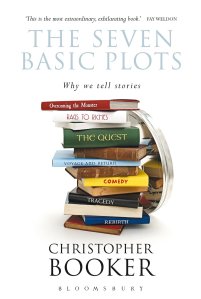 Christopher Booker : The Seven Basic Plots
Christopher Booker : The Seven Basic Plots
I have misgivings about recommending this, because it has almost as many crippling failings as it does magnificent strengths. Paramount among the failings are the hundreds of pages Booker – a social conservative – spends attempting to construct a revisionist history of modern literature as a victory of the Ego over the Self. However, Booker’s core argument that stories reflect our deepest psychological structures is a fascinating and also demonstrably true one. He isn’t the first to make it, Joseph Campbell’s The Hero with a Thousand Faces has been much more significant in enlightening writers to this way of approaching story, but Booker does make an excellent critical analysis of and argument for his seven archetypal plot structures. If you want to write archetypal fiction in the heroic / high fantasy model then this is an essential read, and will very likely change forever how you approach that task. Just ignore everything Booker has to say about modern literature and you will be fine!
 Gail Sher : One Continuous Mistake
Gail Sher : One Continuous Mistake
The relationship between meditation and writing is one that has been explored quite widely from the 60’s onwards, when the counter culture brought many aspects of Eastern spiritual practice to the west. Natalie Goldberg’s Writing Down the Bones is probably the most famous, but Gail Sher brings a sensitivity to the subject that makes One Continuous Mistake quite unique in its Zen-like precision. Writing is a task which requires intense insight in to our inner life, and precise mastery of the balance between the waking logical mind and unconscious dreaming imagination. Gail Sher provides a compassionate guide on how to strengthen both and hence strengthen your writing, using meditation exercises, and also through the longer term practice of your craft and creativity. For anyone who has been overly schooled in the ‘write 2000 words a day, sell a book a year, meet the demands of the market’ way of writing, this book might be just what you need to overcome those ego driven desires and get back to your true self as a writer.
A few I didn’t include and why: Story by Robert McKee because it’s great for screenwriting but can misguide prose writers. On Writing
by Stephen King because, come on, you’ve read this right? Are there any other hidden gems of writerly craft I have negelected?
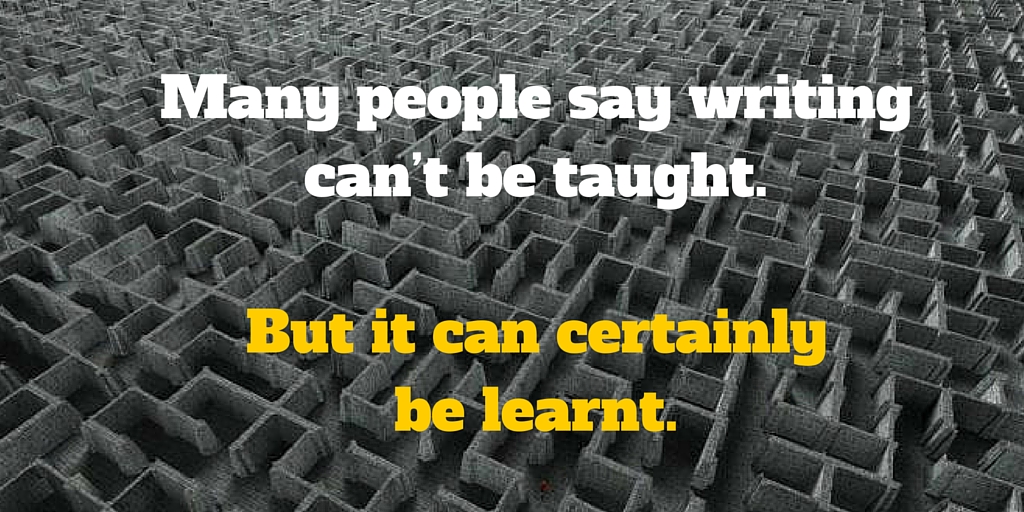
Great list but yes, one of the best you missed is John Gardner’s The Art of Fiction. Gardner likens the reading process to a continuous dream; hence the writer must ensure the dream is never interrupted. If you think of how poor plotting stands out, badly realized characters offend our taste, clunky dialogue jars our ears, you get a sense of what he means and why this metaphor is very effective as an over-arching principle. Without becoming preachy, Gardner also stresses that the writer, as writer, must be utterly honest. You can be a drunk and a liar in daily life, but when you write, you can’t tale short cuts, fudge scenes, or engage in cheap tricks. There’s also a wealth of more practical tips.
LikeLike
‘Writing a Novel’ by Nigel Watts is highly underated. It’s part of the ‘Teach Yourself’ series, but that shouldn’t put you off. Clear practical advice for the begginer, definitely, but I keep dipping into it even now. It was the first ‘how to’ book I read that wasn’t afraid to talk about the therapeutic, redemptive nature of writing.
LikeLike
Yes, the Gardner book is one of the most famous. I like how scornful he is of bad writing, it makes the book hilarious in many places. And of course the now iconic writing exercises. “Describe a lake as seen by a women grieving her son. Do not mention the son, the women, the lake, the sky, or the wolf watching the women.” hahahaha
LikeLike
‘Success.. And How to Avoid It’ by Mat Coward (brutally honest, very funny guide of “Don’t do this, but if you must, this is what will await you.”; TTAPress, 2004);
‘Starve Better’ by Nick Mamatas (equally honest, equally funny: basically the American counterpart — and update — of the thoroughly British ‘Success…’; Apex Book Company, 2011);
LikeLike
Excellent. I definitely want to read Starve Better. The Mamata’s dark humour appeals to me.
LikeLike
When it coming to honing that prose, it’s still hard to beat the book King recommends in On Writing, namely Strunk & White’s The Elements of Style.
LikeLike
well, I’ve just ordered both, since I’m supposed to have read them even before reading this article…..
LikeLike
What jumped to my mind was more general than a specific volume–I think every person studying the craft should study a mix of advice from writers of all genres. If you’re writing lit fic, also study sci fi/fantasy, romance, mystery, etc. If you’re writing a thriller, also learn about sf/f, romance, lit fic, etc.
LikeLike
Loveely post
LikeLike